
-
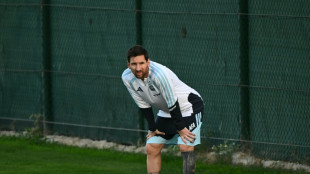 Messi return 'unrealistic', says Barca president Laporta
Messi return 'unrealistic', says Barca president Laporta
-
Bayer narrows loss, upbeat on weedkiller legal woes
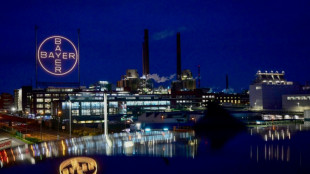
-
 Corruption scandal, court battles pose test for Zelensky
Corruption scandal, court battles pose test for Zelensky
-
DR Congo ex-rebel leader Lumbala's war crimes trial opens in France
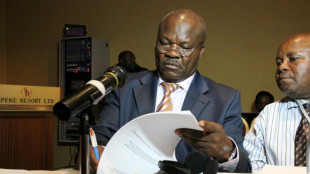
-
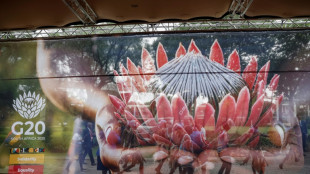 Five things to know about the first G20 held in Africa
Five things to know about the first G20 held in Africa
-
Asian markets rise on hopes over shutdown deal, rate cut
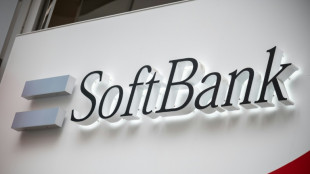
-
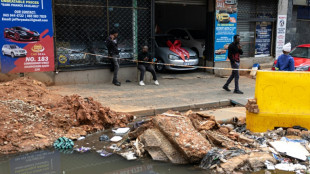 Johannesburg gets rushed makeover for G20 chiefs
Johannesburg gets rushed makeover for G20 chiefs
-
World wine output set for modest 2025 recovery: industry body

-
 Ukraine justice minister suspended over corruption case: PM
Ukraine justice minister suspended over corruption case: PM
-
Osimhen, Mbeumo potential key figures in African World Cup play-offs

-
 Tanzania politicians in shock as cabal takes over after massacre
Tanzania politicians in shock as cabal takes over after massacre
-
Prague cathedral's long-awaited organ to pipe up in 2026
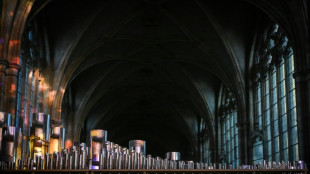
-
 Australia's Hazlewood gets all-clear after Ashes scare but Abbott ruled out
Australia's Hazlewood gets all-clear after Ashes scare but Abbott ruled out
-
Migrant workers in Romania fear wave of hate fuelled by far right
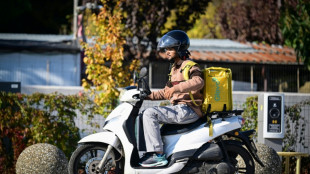
-
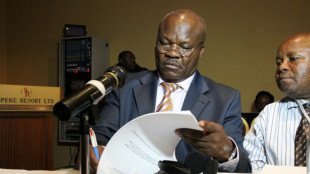 DR Congo ex-rebel leader Lumbala's war crimes trial opens in Paris
DR Congo ex-rebel leader Lumbala's war crimes trial opens in Paris
-
Turkey says military plane crash in Georgia killed all 20 onboard

-
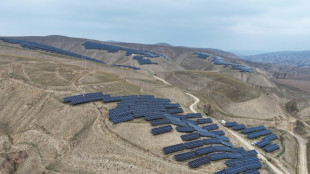 Renewables outpace fossil fuels despite US policy shift: IEA
Renewables outpace fossil fuels despite US policy shift: IEA
-
India bank on formidable home Test record in South Africa series

-
 Australia's Hazlewood in injury scare ahead of first Ashes Test
Australia's Hazlewood in injury scare ahead of first Ashes Test
-
No ordinary Joe: Stokes backs Root to fire in Australia

-
 Humans can no longer tell AI music from the real thing: survey
Humans can no longer tell AI music from the real thing: survey
-
House vote likely Wednesday on ending US government shutdown

-
 Sixers edge Celtics while Thunder reach NBA-best 11-1
Sixers edge Celtics while Thunder reach NBA-best 11-1
-
Cambodia's Prince Group denies link to scams after asset seizures
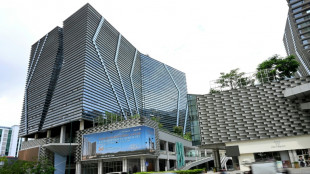
-
 Stokes bats away criticism of England's Ashes preparations
Stokes bats away criticism of England's Ashes preparations
-
Russia loses legal bid to build embassy next to Australian parliament
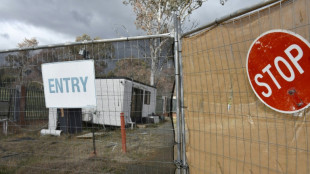
-
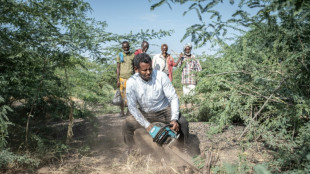 Ethiopia's invasive prosopis tree chokes livelihoods and land
Ethiopia's invasive prosopis tree chokes livelihoods and land
-
'We're already living in science fiction': The neurotech revolution

-
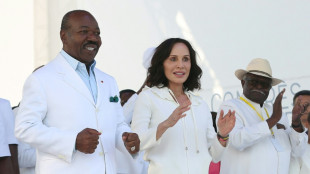 Ousted Gabon leader's wife and son sentenced to 20 years for graft
Ousted Gabon leader's wife and son sentenced to 20 years for graft
-
Asian markets up on hopes over shutdown deal, rate cut
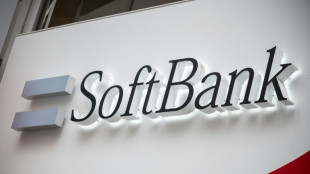
-
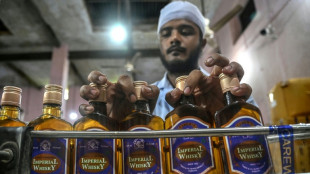 Bangladesh's liquor industry a surprising success
Bangladesh's liquor industry a surprising success
-
Nepal's war victims watch political changes with fragile hope
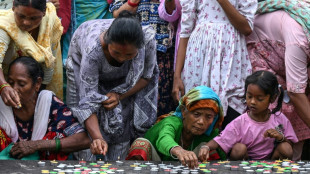
-
 France aim to secure World Cup place as Paris marks attacks anniversary
France aim to secure World Cup place as Paris marks attacks anniversary
-
Russia jails teen musician over anti-war street songs for third time

-
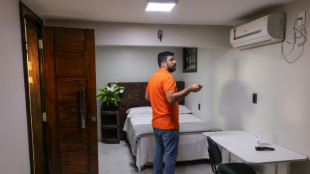 Demand for air con set to triple by 2050, warns UN
Demand for air con set to triple by 2050, warns UN
-
Trump claims 'very big victory' as shutdown vote nears

-
 Indigenous protesters clash with security at COP30 summit in Brazil
Indigenous protesters clash with security at COP30 summit in Brazil
-
France warns over Caribbean 'instability' as G7 talks open
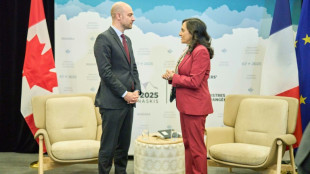
-
 Brazil tries to avoid climate bust up at COP30 summit
Brazil tries to avoid climate bust up at COP30 summit
-
American Critical Minerals Applauds the Newly Updated 2025 U.S. Geological Survey List of Critical Minerals Now Including Both Potash and Lithium

-
 Space Tech Expo Europe Celebrates 10-Year Journey
Space Tech Expo Europe Celebrates 10-Year Journey
-
New Report Reveals Brazilians Face 252 Scam Encounters Annually Despite High Confidence in Spotting Fraud
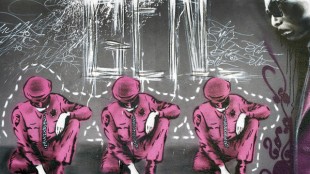
-
 Xsens Announces New Xsens Link for Motion Capture Across Humanoid Robotics, Health, Sports, and Entertainment
Xsens Announces New Xsens Link for Motion Capture Across Humanoid Robotics, Health, Sports, and Entertainment
-
Apex Critical Metals Confirms Significant Magnetic Anomaly at Cap Project, British Columbia

-
 Empire Metals Limited Announces Diamond Drilling Ahead of Pilot-Scale Testwork
Empire Metals Limited Announces Diamond Drilling Ahead of Pilot-Scale Testwork
-
Evotec Receives Milestone Payment from Bristol Myers Squibb Following IND Acceptance in Strategic Protein Degradation Partnership

-
 ZOQQ Expands Its Enterprise Fintech Platform to Empower Global Business Growth Through Seamless Multi-Currency, Card, and Cross-Border Payment Solutions
ZOQQ Expands Its Enterprise Fintech Platform to Empower Global Business Growth Through Seamless Multi-Currency, Card, and Cross-Border Payment Solutions
-
Ethiopia set to host UN's 2027 climate summit, 2026 undecided

-
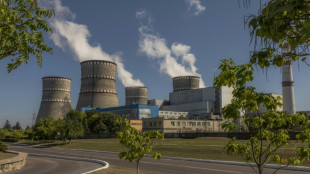 Close Zelensky ally accused of orchestrating major graft scheme
Close Zelensky ally accused of orchestrating major graft scheme
-
'Trump is temporary': California governor Newsom seizes COP30 spotlight
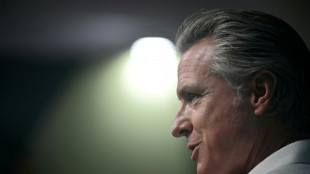

Johannesburg gets rushed makeover for G20 chiefs
When G20 leaders touch down in Johannesburg this month, they will be greeted by a city scrubbed, patched, and polished, all part of a last-minute summit gloss thrown over years of neglect.
The urban sprawl of almost six million people is home to Africa's richest square mile. In recent years, however, it has sunk into disrepair, with open sewers, potholed roads and crowded shacks of corrugated iron lining its fraying edges.
President Cyril Ramaphosa, dismayed by the decay, called the city's state "not pleasing" and ordered a clean-up to spare Africa's industry powerhouse global embarrassment.
Then the bulldozers rolled in.
"It is such a huge shame it had to take other people coming to South Africa for action to be taken," said Abigail Thando, 34, an insurance broker scouting for clients along the streets of Johannesburg's student district.
Nearby, municipal trucks hauled garbage as private contractors were widened a junction overlooking the Nelson Mandela Bridge.
Yet for many locals, the transformation feels cosmetic and belies their suffering.
Resources were being funnelled into high-visibility zones while poorer neighbourhoods remained untouched, said garbage recycler Ricco Tshesane.
"There is no improvement," the 43-year-old said, citing the chronic lack of water and relentless power outages that plague his community.
Several families share a single, outside toilet, he said.
In some areas, taps run dry for weeks at a time, sparking near-weekly protests that have sometimes erupted into clashes with police as residents demand urgent action.
Under South Africa's constitution, clean water, sanitation and electricity are basic human rights that municipalities must deliver to all, even in informal settlements. But for many, those promises remain unfulfilled.
"People who are living on the streets are being taken out with force, without alternatives," said Tshesane.
- 'Housing crisis' -
It was not always this bleak.
Johannesburg, the country's economic heartland, was born from a gold rush in the 1880s, earning it the nickname "City of gold".
But decades of mismanagement and corruption hollowed out its core and most big firms fled to security-fenced suburbs like Sandton.
Disused buildings were hijacked, many in the city centre now packed with undocumented migrants and controlled by criminal syndicates who collect rent from squatters.
In 2023, more than 70 people died when one such five-storey building -- owned by the municipality and listed as a heritage site -- went up in flames.
"I wish all the money was first channelled to fixing our housing crisis. Then we can worry about putting cute signs for the presidents coming," said 21-year-old nursing student Liz Makana.
Still, not everyone was complaining.
Aphiwe crouched beside a G20 logo stencilled onto a low concrete slab, planting fresh red flowers near the summit venue. Nearby, tree trunks along the road were wrapped in blue, yellow and green fabric.
"The big win for someone like me is that we finally have some work to do," said the gardener, who gave only her first name. "We can feed our children."
But within a few days, the bright display had been defaced with red graffitti calling for job creation, in the country where unemployment stands at nearly 32 percent.
- 'Benchmark' -
In response to the discontent, the government has admitted it has fallen short of citizens' expectations and acknowledged that the public anger is justified.
Fresh from a visit to Asia, Ramaphosa defended the clean-up as a benchmark for broader reform across Johannesburg.
"In making sure that we welcome our visitors and as they leave, we must then insist that what we have done and seen done must continue," he told parliament last week.
For Tshesane, the clean-up was coming too late to matter, even for the visiting G20 leaders.
"Change must be a regular thing. They must take care of the city every day," he said.
Uber driver Gracious, in her 50s, agreed.
"I can see they are now busy fixing potholes they pretended not to see," she said. "How can you sweep your house only when you have visitors?"
M.A.Colin--AMWN